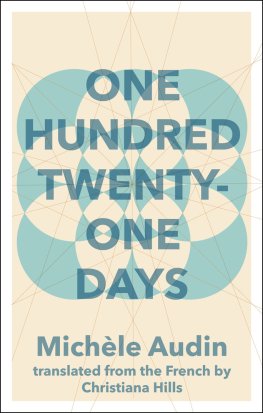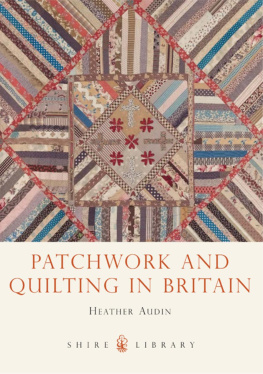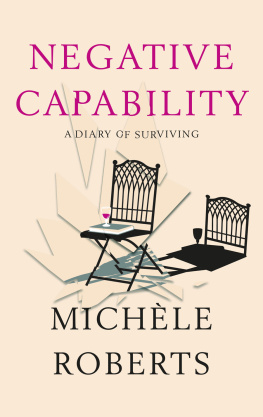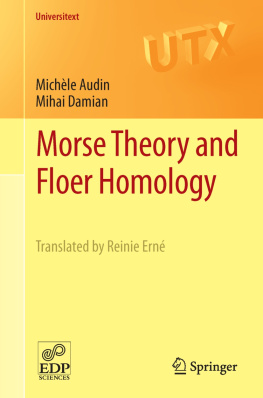Michle Audin
One Hundred Twenty-One Days
Author & Translator Biographies
Winner of a French Voices Award
What holds the special magic of this text? From its clever construction, and the juxtaposition of its narrative modesfrom which emerge the most vibrant, intimate, and passionate voices that tell of sufferings, loves, and pains. A beautiful mosaic work which the reader comes away from moved as if from a dream. France TV, Culturebox
MICHLE AUDIN is a mathematician and a professor at lInstitut de recherche mathmatique avance (IRMA) in Strasbourg, where she does research notably in the area of symplectic geometry. Audin is a member of the Oulipo, and is the author of many works of mathematics and the history of mathematics, She has also published a work of creative nonfiction on the disappearance of her father, Une vie brve (Gallimard, 2013) Audin is the daughter of mathematician Maurice Audin, who died under torture in 1957 in Algeria, after having been arrested by parachutists of General Jacques Massu. On January 1, 2009, she refused to receive the Legion of Honor, on the grounds that the President of France, Nicolas Sarkozy, had refused to respond to a letter asking for information on her father, the possible whereabouts of his body, and recognition of the French governments role in his disappearance. For the Oulipo, Audin has contributed to a collection of short stories, Georges Perec and the Oulipo: Winter Journeys (Atlas Press, 2013), and edited and annotated an abecedary of Oulipo works, OULIPO LAbcdaire provisoirement dfinitif (Larousse, 2014). One Hundred Twenty-One Days is her first novel and was published to universal acclaim in 2014 by the prestigious Gallimard publishing house in France.
CHRISTIANA HILLS is a literary translator who graduated from NYUs MA program in Literary Translation (French English) and who received a French Voices Award from the Cultural Services of the French Embassy in the United States for her translation of One Hundred Twenty-One Days. Hills is currently a doctoral candidate in Translation Studies at Binghamton University in New York.
One Hundred Twenty-One Days
KALLE:
I like the way it moves towards the war.
ZIFFEL:
You think I should arrange it in chapters after all?
KALLE:
What for?
B. BRECHT, Conversations in Exile
[] (the form of a city
Changes more quickly, alas, than the human heart)
C. BAUDELAIRE, The Swan, Parisian Scenes
CHAPTER I. A Childhood (1900S)
I start to write:
Once upon a time, in a remote region of a faraway land, there lived a little boy. And this little boy was full of an insatiable curiosity and he was always asking ever so many questions. The faraway land where he lived was in Africa, in a country that encompassed a big river called the Saloum River, and the little boy filled the land around this river with his questions.
He asked his father why the Blacks on the plantation were beaten with a stick, and his father spanked him with his leather belt. He asked his mother why she didnt read her Bible by herself, and his mother spanked him with her two white hands. He asked the village priest why he drank the communion wine during Catechism class, and the priest spanked him with his cane. He asked the schoolteacher why the same number, , was used to measure all circles, both big ones and little ones, and the schoolteacher didnt spank him.
I must tell you, O Best Beloved, that some good fairies were watching over this little boys cradle. If there were a few evil fairies as well, no one noticed. So there will be no discussion of evil fairies at this point in the tale.

A fairy tale is one way to recount history. The Saloum River, its village, its plantation, its pirogues, and its flame trees form the setting for this tale. The little boys parents, his little brother, the fairies, the priest, the schoolteacher, a dog, and a few of the villagers are its characters. The little boy who lived in this exotic setting at the center of this little world was named Christian. The good fairies, along with the schoolteacher who didnt spank anyone who asked questions, were responsible for the fact that he really loved going to school, where he was taught to read books, to write fast and well, to count fast and high, and to ask questions. As for his parents, they thought that the time he spent at school was much too long. Because you see, although his mother liked that he could read the Gospels aloud to her, his parents wondered why he needed to learn any more. One day, while spanking him with his leather belt, the boys father said: Well, youre not going to become a writer, in any case! Because, O Best Beloved, at this time on the banks of the Saloum River, there were public writers who would write letters for people and read them the letters they received. And, you see, the little boys father was working hard to make the Negroes sweat on the peanut plantation, and he thought that the writer, who spent all his days sitting in the shade of a kapok tree right in the middle of the village, was a lazy man.
One fine morning, at the beginning of summer, the schoolteacher came to the plantation and explained to the little boys parents that not only could their son read and write fast and well, but that he also knew how to do sums using very big numbers, and that it would be good to send him to secondary school, in the big city, so that he might learn all that can be done with all those big numbers and all that reading and writing. But you see, O Best Beloved, at this time and in the land around the Saloum River, no boy had ever gone to secondary school. His parents listened politely and said they would think about it. Yet as soon as the schoolteacher left, they fought, his mother kicked, his father punched, then they both started spanking the little boy without wasting any more time. They even called the priest over for help. The boys little brother was also spanked for good measure. A little later, when that was over, the little boy came across a yellow dog that belonged to one of his friends, and said to him:
My father has spanked me, and my mother has spanked me, and the priest has spanked me. And still I want to go to secondary school in the big city to learn how to do calculations with even bigger numbers and learn more about the number .
And the little yellow dog licked the little boys face affectionately as the little boy scratched him behind the ears.
Naturally, a few days later, the schoolteacher came back to the plantation, then the mayor, then the schoolteacher once again. Each time, they negotiated, but with no success. Until the day when the schoolteacher came back saying that he had found a scholarship, and the parents agreed to let the little boy leave. They all spanked him once more for luck. Then he went away, a little swollen. It was a fine morning, at the time of the equinox. The little boy rode down the Saloum River with his little suitcase. On the pirogue, the chickens had been pushed out of the way to clear a comfortable place for him. It was the beginning of his new life.
After the pirogue, the little boy took a steamboat that eventually brought him to the big city. The world around him had expanded. At school, he went straight into seventh grade. He was a very good student, both a quick learner and a hard worker. He was eager to learn so that he could find answers to the questions that stirred his insatiable curiosity. He even got caught up in German, because at that time, O Best Beloved, they learned German at secondary schools in the big cities of faraway lands. It was useful to learn German. The little boy learned some poems by heart that were written by a German poet named Heine. He really liked the story of the









